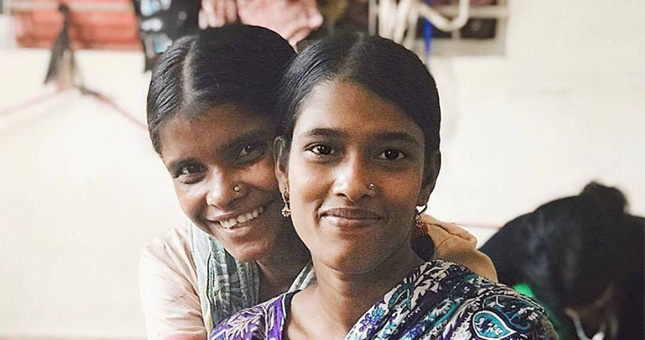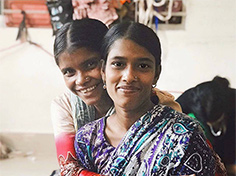
Shopping for the Good
Shelley and Wayne Jones (MCS 2012, Marketplace) live in Calgary, AB, with their three children: Reese, Maddie, and Julian. You can find dignify at shopdignify.com. You can find Wayne’s career direction work at thestoryofmywork.com.
How one family business brings positive impact for both their Bangladeshi artisans and their buyers
Regent World: What is dignify?
Shelley: dignify is an online retail store that sells kantha blankets: one-of-a-kind quilts, handmade from repurposed saris in Bangladesh. All of our blankets are stitched by women who had previously been living on the street, working in sex work (often these go hand in hand), or in a vulnerable situation at risk of either/both.
We run the operations completely online, out of a room in our basement that has floor-to-ceiling shelving full of blankets, shipping supplies, and more blankets! It began as a lark, a side project while I was on maternity leave; now, we both work on it, and it is the primary source of income and livelihood for our family.
RW: Where did you get the idea for starting this business?
Wayne: It began with my Christian Social Enterprise class at Regent in 2011, where an auditing classmate, Robin Seyfert, was working on starting a social enterprise in Bangladesh. She had been serving women there with Mennonite Central Committee, and was preparing to begin a business to employ vulnerable women as they graduated the social programs.
I kept calling the blankets “sweaters,” which is so embarrassing now—but handicrafts and textiles were way outside of my realm! But, we loved the idea and wanted to support her work down the line.
A year later, after finishing up at Regent, a widowed friend of ours was getting remarried and Shelley bought her one of Robin’s kantha blankets as a gift. The other women at the bridal shower just loved the concept, the meaning of the gift, and the actual product. I mentioned to Shelley (who was at home as a full-time parent to our 1- and 3-year old daughters) that she should think about importing them and selling them in Canada.
Shelley: I said, “that sounds like a lot of work. Why don’t you start an import business with two toddlers at home!” I didn’t take his suggestion very seriously.
But, I began to hear the whispers of the Spirit. I’ve never been drawn to aid work or a caring profession at all; my background is in marketing. So, the LORD drew me in with my own gifts, interests, and expertise. I began lying in bed at night, thinking: What would this be called? What would the logo look like?How would the website feel?
About 6 months later, in November 2012, we launched the site to a handful of friends, and friends-of-friends, sharing it on Facebook. By the end of the launch weekend, I was ordering more blankets. By the time they arrived, 2 weeks later, I had sold all but 1 of our initial 60!
The business switched to our primary work and family income in year 3, and it continues to grow, remarkably, every year.
RW: What is it about running dignify that you find most meaningful and exciting?
Shelley: Well, the obvious answer is that there is tangible, real, social impact. We’ve lost count of exactly how many blankets have passed through our hands, but it is around 4,000: the equivalent of roughly 90,000 hours—46 years—of safe, healthy, dignified employment for women in Bangladesh.
I write often in notes to customers (we send handwritten thank-you notes with every package) that their purchase truly, literally, is making an impact in someone’s life. Life as a girl, or woman, in Bangladesh is very challenging, very precarious. There are so many risks like child labour, trafficking by a “kind” stranger or a trusted family member, family violence, and of course, sexual exploitation. For me, these are distant fears, nightmares, not a raw reality like they are for so many women.
It is meaningful to support this work that brings hope, brings love, brings the hands, feet, and heart of Christ to people who are very much in need of them.
But, there is another answer to the question, too. What is exciting and inspiring to me is that the LORD has found a wonderful fit for me to work out my gifts, skillset, and motivations in a flexible, creative job!
I have always been a jack (jill)-of-all-trades, master-of-none. In a culture of niched experts, I felt at a bit of a loss. But, as an entrepreneur, I am a perfect fit. I have had plenty of practice working out the LORD’s vocation for me in “the other six days,” as Paul Stevens would say. I have learned to pray about Pinterest ads or how to resolve a mistake we’ve made with a customer. God has healed desolation about social media engagement, and anxieties about sales numbers (though, those pesky concerns still creep in from time to time).
Robin will tell me stories about her days in Bangladesh, including many heartbreaking, tragic events and people she encounters. I tell her, “God bless you, because I could not survive; I would be drowning in despair.” She replies that she couldn’t endure the run-around pace of being a working parent in North America!
We are each doing what we can, where we are. The complement is a gift, and I think, a beautiful outworking of the body of Christ.
RW: What is the greatest challenge?
Wayne: Anyone who is self-employed can attest that there is always a nervous energy, since everything begins and ends with you. It is the two-sided coin: the great benefits—flexibility, self-direction, autonomy—are closely intertwined with the great challenges: for example, work is never fully turned off, and there are concerns about sustainability, loneliness.
Shelley: Another challenge is simply the grind of work once the adrenaline wore off. There is a relentlessness to keeping all the parts moving, especially with so much at stake (enabling the continued employment of so many women). It is a challenge to keep up the intensity and passion, when the other needs of life (like our three kids) continue to press, or when the “starter” in me just wants to move on to something shiny and new.
And, working with your spouse always has its difficulties!
RW: How did your Regent studies inform your work with dignify?
Wayne: Regent has broadened and nuanced our perspective on what makes a successful business. Usually in business-building, the cultural norms dictate that you should focus solely on profit maximization. Indeed, getting a profit and sustainability are important (and, honestly, are things that I stress about), but with dignify, we want our goals, our telos to be larger than that.
We want a business that is holistic: that it is good for the people who are making the products, the people who are running the business, and the people who are getting the product. As Jesus is the way, it is important for us to pay attention to the “way” we do our business, not just reaching a certain end result.
Shelley: Regent has trained us well (Wayne in actual classes, and me auditing and by proxy)! We know that the work is holy because we are doing good, but it is also holy because God’s presence is in it—from spreadsheets to import fees to Photoshop.
People will ask Wayne about whether he is “using” his degree in his work. The reality, one that is harder to grasp, is that Wayne’s degree created an entire shift in our perspective and the pattern of our everyday lives. We both use his degree every day as we live more incarnationally in work, as we invite and listen to the Holy Spirit, and as we pray over our daily circumstances.
“Ora et labora” is written on a chalkboard in our office. It is a Latin phrase favoured by Benedictine monastics that we first heard while watching Sister Noella make cheese in the Michael Pollan miniseries Cooked. Inspired by her, we try to keep the attitude of “pray and work” at the center of dignify.
RW: For those who are just starting to think more about buying ethically, what are some guidelines you’d share for starting out.
Shelley: This is a great question to ask, and one that we address a lot in our weekly emails and store blog. The most important thing, I believe, is simply going back to a very basic question: “Do I really want to buy this?”
It’s so straightforward that it sounds inane, but lots of us need the simple reminder to slow down, be thoughtful, consider, and then take action (to buy). Being wise to our impulses, and to the powerful tactics used by retailers to drive our purchases, will go a long way to improve our consumption patterns.
It can be very discouraging to feel the need to go “all-in” with ethical shopping, by purchasing everything fair trade, organic, and all of those other worthy labels. I know that the reality—particularly when you have multiple people to feed, clothe, and support—is much more complicated and muddy than our best intentions.
For someone delving into conscious shopping (beyond shopping less frequently), I encourage small steps. For example, I knew there were issues with my food and the production chain, but I couldn’t change everything, so I started with buying free-range eggs. You may not be able to switch your entire wardrobe to domestically produced, “ethical” clothing, but you could stop visiting the Gap sale rack every few weeks (and instead buy a piece or two each season).
And, if you have the financial means, then I certainly encourage you to seek out businesses that actually deserve your money! When we donate to a charity, we often want to know how they use the money we’ve given them; but, with retail transactions, we rarely use the same critical eye. If a business has a family of owners all worth billions while their employees need food stamps… is that somewhere I want to support? These are the thoughts worth considering, I think, if you want to shop ethically.
Iain Provan said in a lecture while we were at Regent, “Doing the right thing usually costs more.” I don’t like that to be true. I’m selfish, and it’s very inconvenient! But, ultimately, I agree.


